Last month the Independent Electoral Commission (IEC) held public hearings on the Political Party Funding Act, which will force parties to disclose donations and, in the process, reveal how money shapes our politics.
At the same time, President Cyril Ramaphosa is under fire after a public protector report and a series of leaks identified those who bankrolled his CR17 campaign for the ANC presidency. As struggle veteran, Mavuso Msimang, put it: “He who pays the piper expects to call the tune.”
This story offers one example of the corrosive effect of money in politics and how a politically-connected firm, Regiments Capital, built a financially symbiotic relationship with the ANC – attempting to convert donations into goodwill, lobbying into favours, and facilitation fees into contracts.
But it is really a story about the cancer eating the ANC and how a supposedly loyal funder fueled the toxic practices that are killing the party.
***
The bar tab that night was nearly R6,000.
Compared to the value of the contract it was intended to unlock, the bill should have been as insignificant to him as the hotel bar’s complimentary peanuts. But it still stuck in the chairman’s throat.
“On the lobbying front … I think that went exceedingly well, albeit expensive,” Litha Nyhonyha told his colleagues in an email two days later. “The Ekurhuleni chaps can drink you dry.”
It was 28 July 2008 and Nyhonyha, the executive chairman of financial services firm Regiments Capital, had spent his Saturday watching Kaizer Chiefs play Manchester United with two senior ANC members from Ekurhuleni.
Although the Chiefs’ 4-0 defeat had been “disappointing”, he was hopeful that his primary goal of securing political support for a R1.8-billion property deal in Ekurhuleni municipality would be successful.
Back in March 2008, the Ekurhuleni Development Company (EDC) had appointed Xihangu Realty Developers, a consortium led by Regiments’ fund management division, to build 14,000 low-cost houses on government-owned land. But at the beginning of July, Ekurhuleni’s then-mayor Duma Nkosi unexpectedly resigned, and in the political turmoil that followed, “bureaucratic obstacles” had sprung up that now threatened to derail the lucrative property deal.
Hoping for a political solution, Regiments had deployed Nyhonyha, and his credit card, to get the deal back on track.
There were good reasons to send Nyhonyha. A chartered accountant by training, he was both a self-made businessman and a loyal member of the ANC. In 1992, Nyhonyha co-founded Thebe Investment Corporation, a pioneering black-owned investment company whose founding shareholder, the Batho Batho Trust, has long been regarded as a funding vehicle for the ANC.
“[O]ur contacts [are] our currency,” Nyhonyha told a fellow Regiments’ director in a 2005 email.
For 13 years, until Regiments closed its doors in 2018, the company would perfect the art of turning those contacts into capital.
Like many new firms, Regiments would focus its attention on securing contracts from municipalities and state-owned entities where it could leverage both its black ownership credentials and political connectivity – a consequence, perhaps, of how apartheid’s legacy had skewed access to private sector opportunities.
Leaked emails show that Regiments initially courted the ANC in Johannesburg, where it had also received and would continue to receive lucrative contracts from the city. With time the relationship became symbiotic but also problematic: the same elected officials who were meant to oversee Regiments’ work for the city, also asked Regiments for money for the ANC. And no one was inclined to switch off the tap or check if it was leaking.
The emails also show that when lobbying and donations did not work, Regiments turned to more underhanded tactics.
According to Nyhonyha’s email, one of the two people present at the Kaizer Chiefs match in July 2008 was Sochayile Khanyile, the then-secretary of the ANC in Ekurhuleni.
“They have both given support for the project and offered to unblock the apparent bureaucratic obstacles we are now experiencing,” Nyhonyha reassured his colleagues that Monday morning.
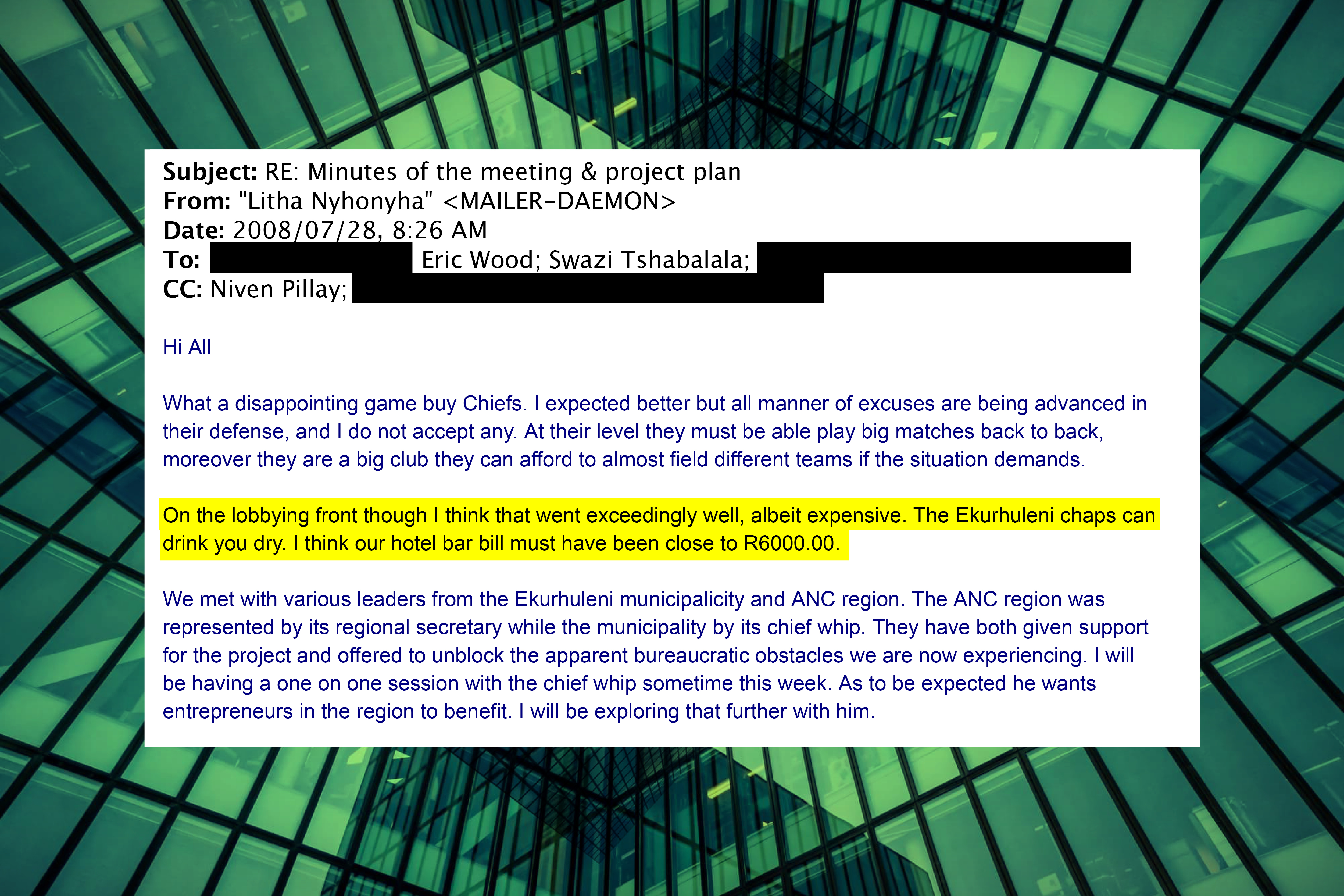
Khanyile, who is now chief whip of the ANC in the Gauteng legislature, told amaBhungane he would not comment on “correspondences … written by other people, unless they themselves explain the facts”, but added that during his time in Ekurhuleni he only got involved in “matters requiring our strategic/political guidance to the municipality to implement both the ANC manifesto … and the medium-term vision of the municipality”.
Whatever strategic/political guidance Khanyile offered back in 2008, if any, evidently did not work. Four months later, with the deal still stuck, Nyhonyha instructed his partners to draw up a “facilitation fee agreement” with an unnamed facilitator.
“[T]he facilitators of this contact with the city manager want us to formalize our proposal regarding their involvement and compensation for that. They are confident that they can facilitate a speedy conclusion of this project,” he told his Xihangu partner Swazi Tshabalala in a 12 November 2008 email. In exchange, “we will pay them R10m, being a once off facilitation fee”.
Tshabalala was the chief executive of a company called the Industrial Development Group, the other major shareholder in Xihangu consortium. She would later be appointed to the boards of Tiger Brands, South African Airways, Stanlib and, in 2018, MTN.
What Nyhonyha was talking about back in 2008 appears to be a thinly-disguised kickback agreement.
If the fixers could persuade Ekurhuleni municipality to transfer land to Xihangu’s property fund, they would receive R10-million, including a R1-million “advance payment” as soon as the land was transferred, according to a draft version of the contract.
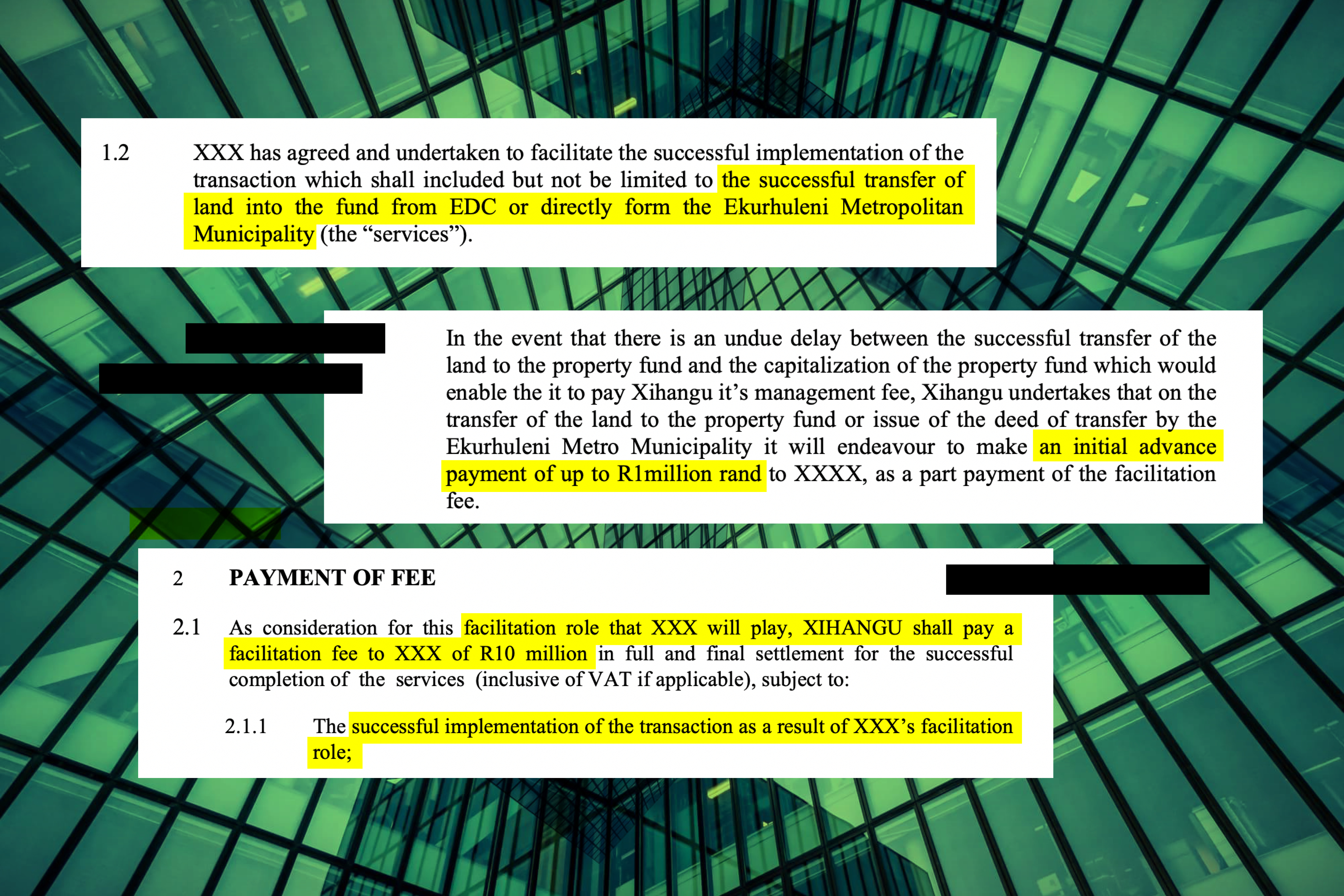
Detailed questions were sent to Regiments last year. The firm’s attorney confirmed that the directors had received our request and would “respond if they are inclined to engage the media”. They did not respond.
Tshabalala, who is now the chief financial officer and vice president for finance of the African Development Bank, also ignored detailed questions emailed to her directly at the bank and via a spokesperson at MTN.
Patrick Flusk, the city manager that the facilitators claimed to represent, told amaBhungane this week: “[Nyhonyha] was clearly lying to his partners because there was no way I would have allowed anybody to get land like that.”
When we suggested that it was more likely the facilitators had promised something to Nyhonyha but failed to deliver, he added: “It would have been difficult to persuade me to go that route; I think there were shenanigans happening behind me that didn’t come to my attention.”
Despite the R10-million incentive, the property deal in Ekurhuleni did not go ahead – instead, the municipality’s 2011 financials show, the contract was cancelled and that Xihangu “reserve their rights” to sue.
Even though Regiments had failed in Ekurhuleni, emails show that the firm’s partners would keep looking for ways to leverage their political connections in other places.
POLITICAL PARTIES: Bankrolling democracy
Around the time that the Ekurhuleni deal was being derailed, an SOS landed in Nyhonyha’s inbox from a different part of Gauteng.
It was July 2008, and with just 10 days to go before the Greater Johannesburg region of the ANC held its elective conference, there was still no funding for the auditorium in Midrand or the 350 hotel rooms for delegates.
“The total cost (venue and tshirts and bags and printing) for this conference is in the region of R1 000 000.00,” the ANC beg-letter, attached to an email in Nyhonyha’s inbox, read.
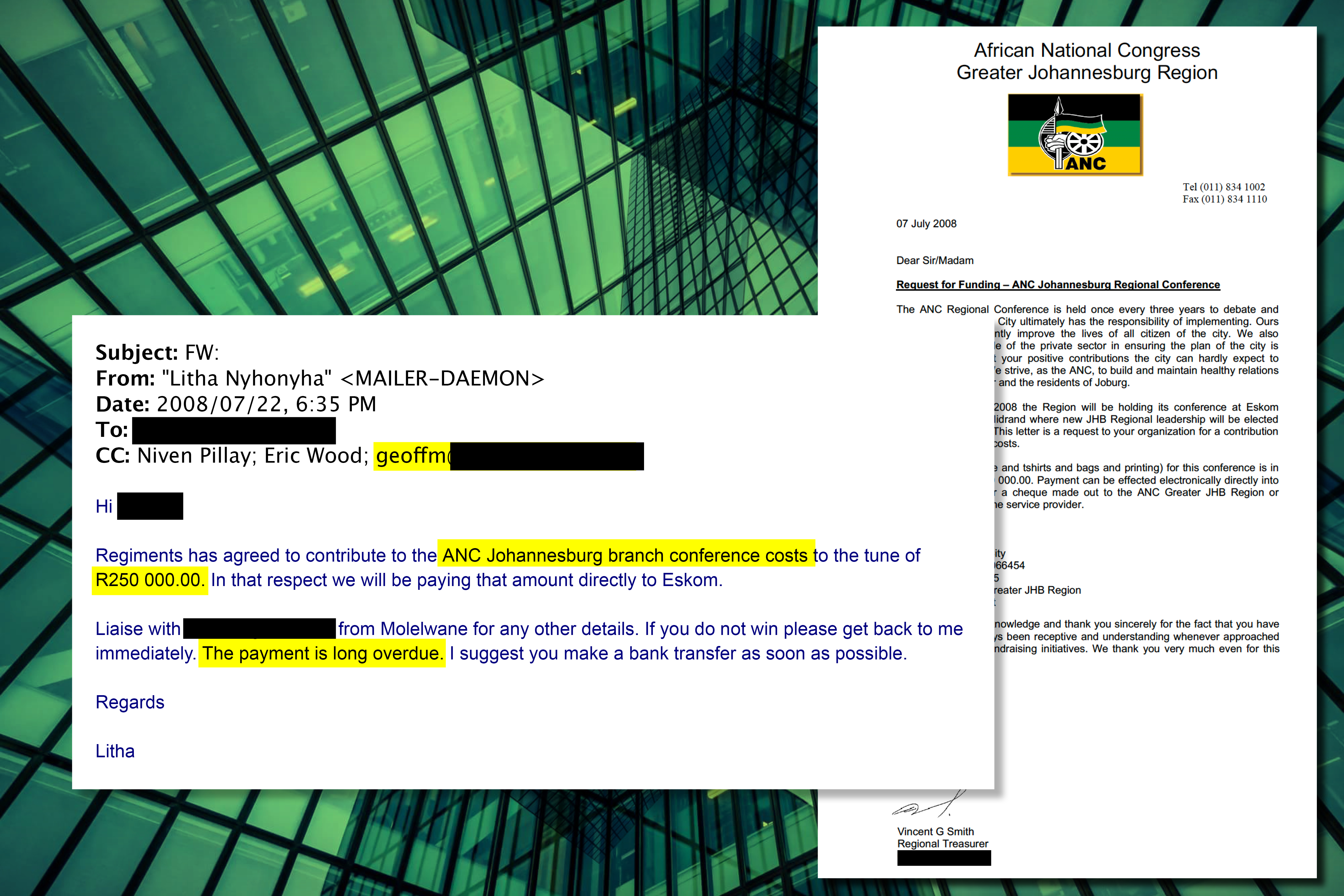
“We also want to acknowledge and thank you sincerely for the fact that you have over the years always been receptive and understanding whenever approached to assist with our fundraising initiatives. We thank you very much even for this contribution.”
Although the letter was signed by the region’s then-treasurer, Vincent Smith, it was forwarded to Nyhonyha by Geoff Makhubo, a business partner of Regiments who would be elected as Smith’s successor a few days later.
By 7pm, Nyhonyha had instructed Regiments to pay R250,000 towards the conference.
That Regiments funded the ANC was never a secret.
“We believe in this country democracy should be supported financially and, yes indeed, we do donate to the ANC,” Nyhonyha once told amaBhungane an interview.
Evidence collected from Regiments emails suggests that every time the party needed money, the Regiments chequebook delivered.
In the lead-up to the 2009 national elections, every level of the ANC put out its hand: there was R100,000 for the Tshwane branch which Nyhonyha offered to deliver “personally”; R300,000 for an ANC golf day; R20,000 for a “report back” dinner with president-in-waiting Jacob Zuma; R633,681 to fund the ANC’s “ride ‘n braai” election campaign; and – before the votes had even been counted – R418,556 for an ANC victory party, which included “bouncers” (x 10 @ R800 ea), “girls” (x 4 @ R500 ea) and “Amandlaness t-shirts” (x 3000 @ R100 ea).
Regiments, from what we can tell, paid it all.
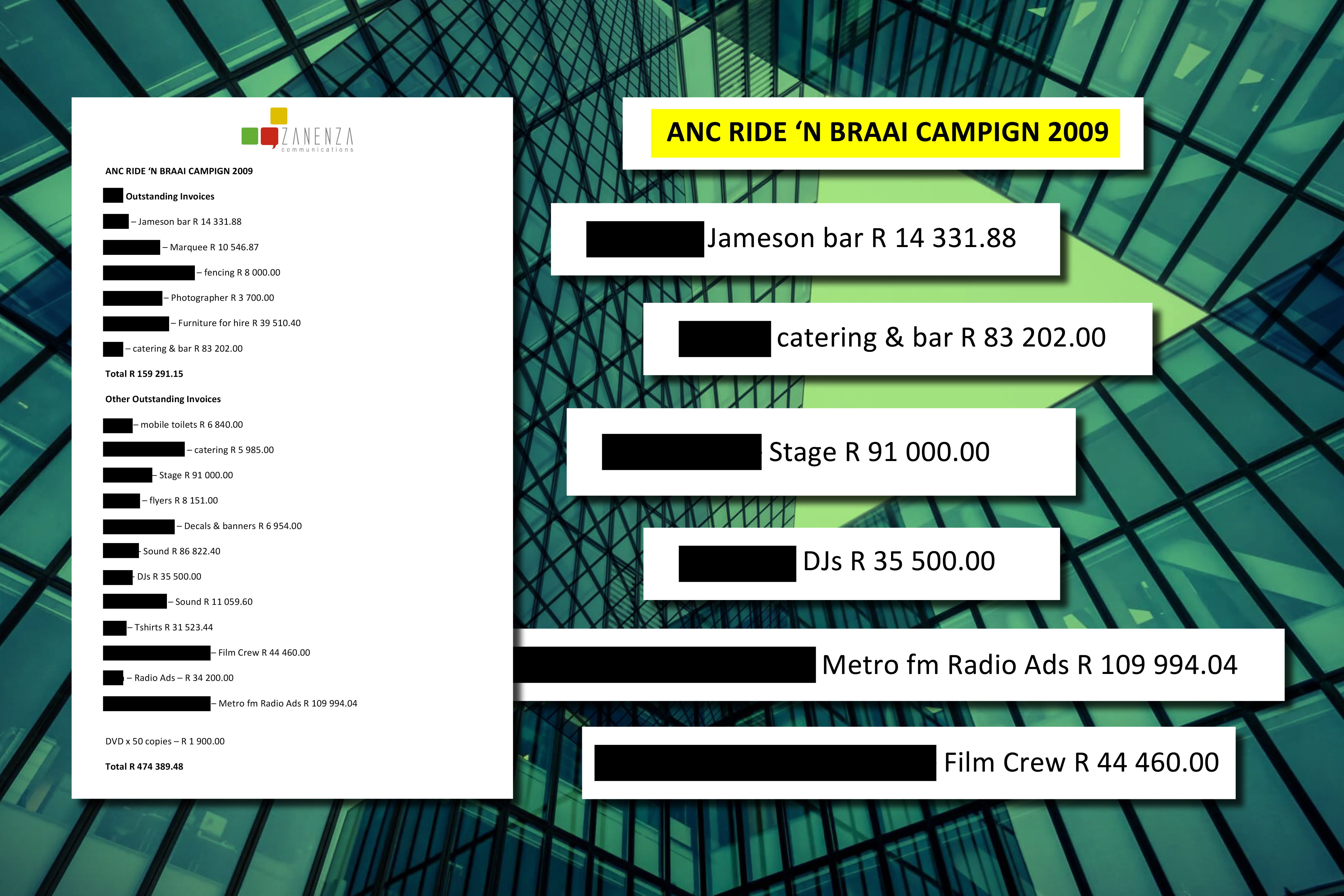
- Read our Q&A with amaBhungane advocacy coordinator Karabo Rajuili, who explains why amaBhungane is pushing for greater transparency of how political parties are funded.
The majority of Regiments’ donations would not go to Luthuli House, however, but to Regiments’ local branch in Johannesburg where Makhubo was now treasurer. Emails show Makhubo would repeatedly ask Regiments for money for the ANC, often at short notice.
In August 2010, Makhubo told Regiments he “urgently” needed R200,000 to R250,000 to fund “the realignment of branches with new municipal demarcations ahead of the 2011 local government elections” (nine months away). In March 2013, he requested R500,000 to “kickstart our election campaign” (more than a year away) and in July that same year, an unknown amount for “election events” happening that weekend. In November 2013, the Johannesburg ANC requested another R300,000 for “funding of elections”.
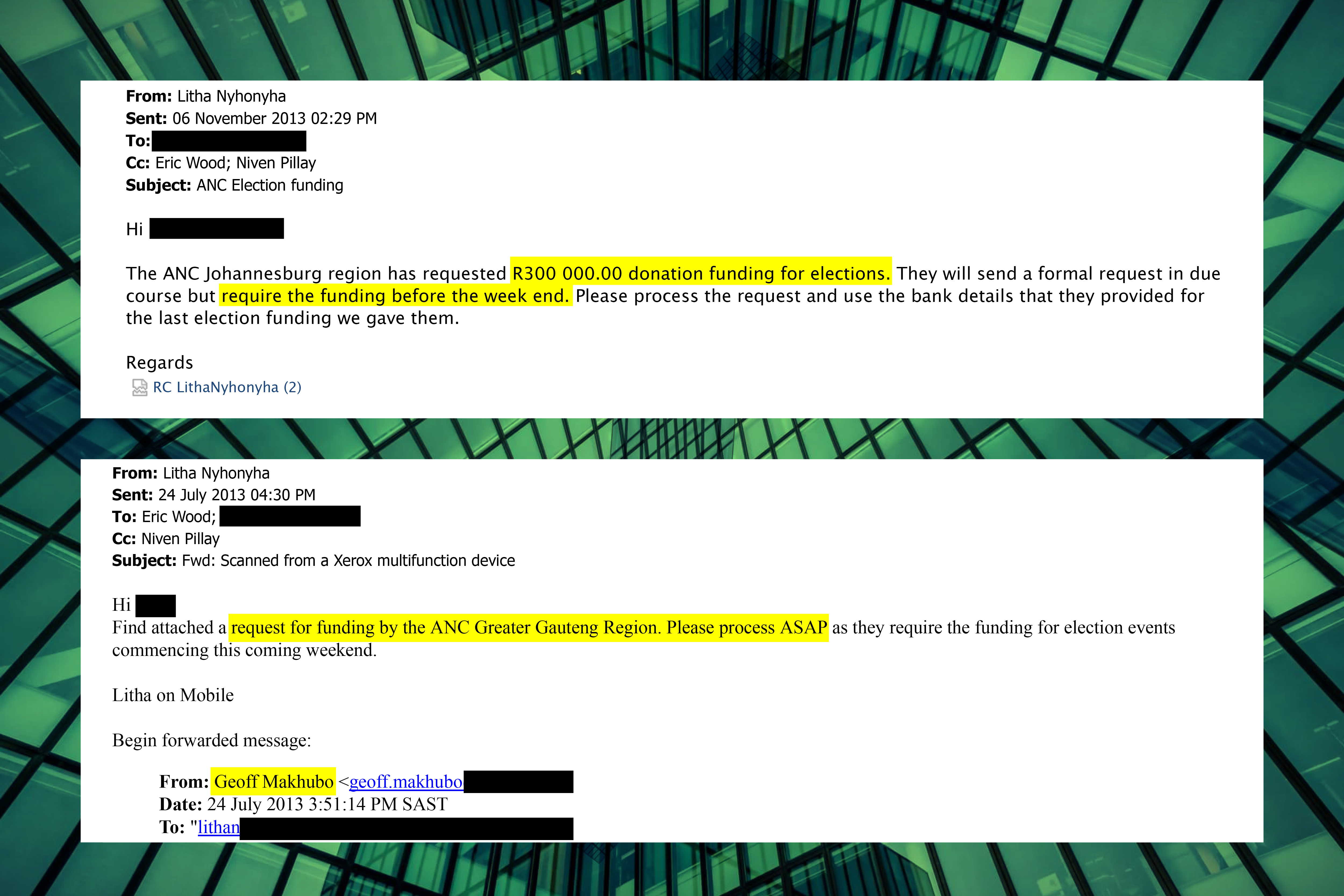
“They will send a formal request in due course but require the funding before the week end,” Nyhonyha told his colleagues, instructing them to transfer the money immediately.
But as generous as Regiments was with the party, its real investment was in people who were willing to move the “bureaucratic obstacles” standing in its way.
POLITICIANS: A new kind of trickle-down economics
It is clear from the emails that Nyhonyha could be ruthless when it came to business.
When Regiments was trying to close the Xihangu deal in Ekurhuleni, Nyhonyha told a minority shareholder that its stake would be cut from 15% to 5%, because “we need to accommodate other shareholders whom we think can assist with the closing of this project”.
“Whilst you added value at the early stages of the project, it has been abundantly demonstrated over the past months that you are no longer able to add any value or can only add limited value going forward,” he told the partner in an email.
But were all of Nyhonyha’s partners chosen with their political connections in mind?
Around the same time, Regiments was also putting together a consortium to buy shares in Vox Telecom. Included in a group of shareholders dubbed “strategic partners” was Makhubo (then regional ANC treasurer) and Parks Tau, Johannesburg’s then- member of the mayoral committee (MMC) for finance. Tau who would later become Johannesburg mayor, withdrew shortly before it was finalised. (Read his full response.)
Also in this politically-connected group was ANC fundraiser Miles Nzama, Gauteng health MEC Brian Hlongwa and businessman Sipho Twala. Documents show that each of the “strategic partners” was allocated R1.1-million in shares, while Nzama doubled his stake when Tau withdrew.
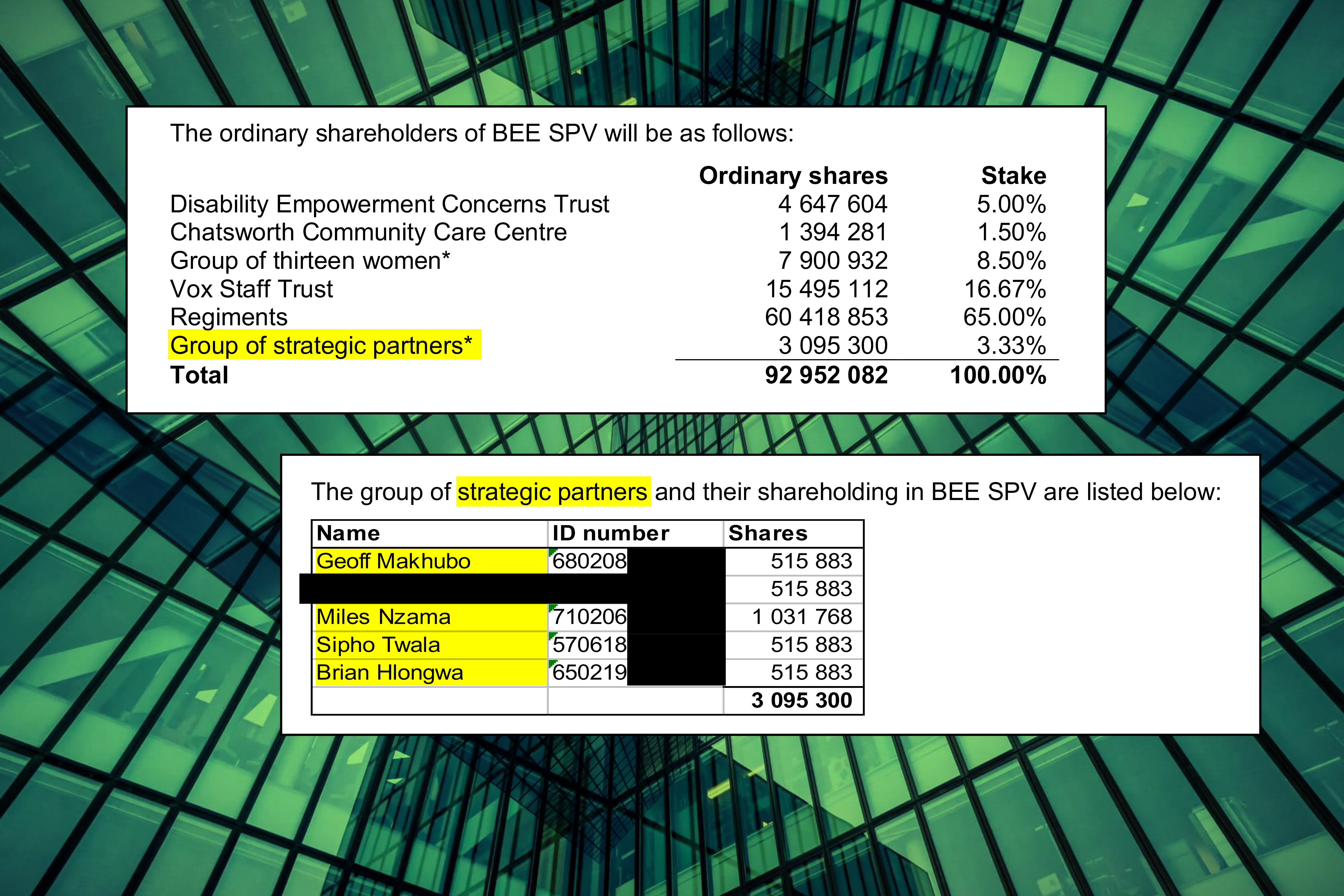
Nzama told us that the deal was done in his private capacity and that he was not acting as a proxy for the ANC, while Hlongwa, who resigned as chief whip of the ANC in Gauteng last year following a damning Special Investigations Unit report, was deliberately obtuse and said he did not “know anything about the Telkom deal”. (One of the report’s findings was that a separate division of Regiments paid a R1-million deposit on Hlongwa’s house.)
Twala, meanwhile, sat on the board of the Ekurhuleni Development Corporation (EDC) and had a hand in approving the Xihangu deal, making his presence in the Vox deal even more problematic. When contacted last week he told us: “I was not aware of the transaction,” and speculated that while his name appears in “draft documents [it] may not have been included in the final one”.
He also told us in a written response that he had “no business dealings with Regiments” and it was therefore “not necessary” for him to recuse himself when the Xihangu deal came before the EDC board.
When we pointed out that his name does appear in the signed shareholders agreement and that there was ample evidence that he had business dealings with Regiments, he failed to respond further.
Ultimately, no one got rich from the Vox deal though. The share price collapsed and the Industrial Development Corporation, which had provided R105-million to fund the deal, agreed to write off a significant loss by accepting the consortium’s devalued shares as settlement. (Read the IDC’s full response.)
Makhubo previously told us that if the deal had not collapsed he would have made a “contribution” towards the R1.1-million shares he had been allocated.
But by 2008, Makhubo was also benefitting in other ways. As we previously reported, in 2006 Regiments had entered into a secretive agreement with Makhubo’s Molelwane Consulting to, among other things, “maintain… strategic relationships” with the ANC-controlled City of Johannesburg on Regiments’ behalf.
Over the next decade, Molelwane would receive 10% of Regiments’ R300-million contract to manage a so-called “sinking fund”, a debt structure which would fund the city’s future debt repayments.
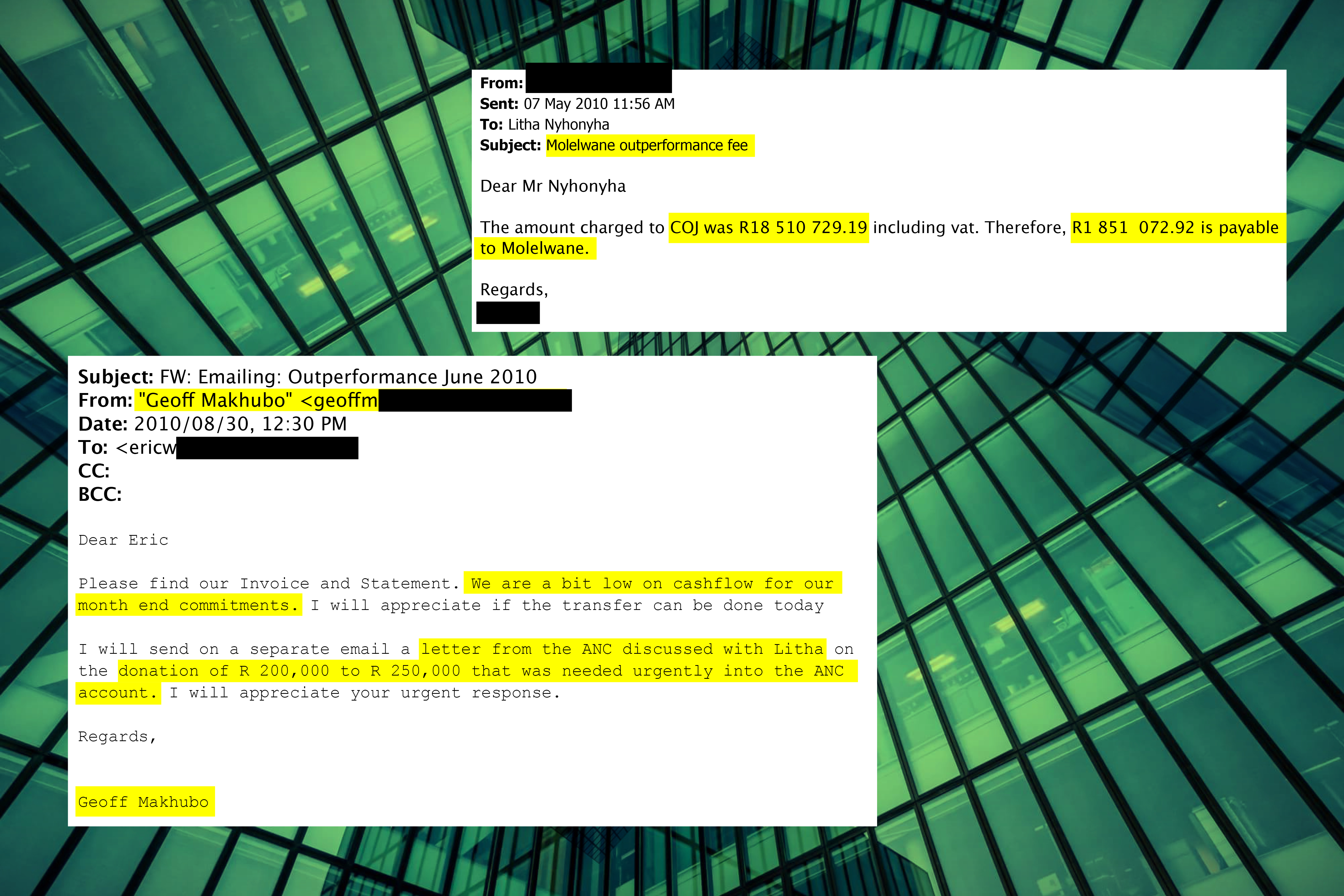
And at least some of Molelwane’s money would flow back to the ANC, a detail that Makhubo volunteered in a written response last year: “Molelwane Consulting was a commercial entity and not a fundraising vehicle for the ANC but would from time to time contribute to the ANC.” (Read Makhubo’s full response)
When the original contract was signed, Makhubo held no official position in the City or in the ANC. But as Makhubo was elected as ANC treasurer and then appointed as MMC for finance in the City of Johannesburg, the conflicts multiplied. Makhubo told us he took steps to avoid such conflicts, but the evidence he presented is unconvincing.
By 2011, Makhubo was tasked with overseeing the sinking fund contract that both his own company (Molelwane) and one of his ANC region’s key political funders (Regiments) were profiting from. This contract and others that Regiments received from the City of Johannesburg during the ANC’s tenure are currently under investigation by the city’s forensic unit.
It was a model based on politics and money that Regiments would try, but fail, to replicate in other parts of Gauteng.
FIXERS: Regiments gets pointers on how it’s done
In 2006, Regiments had tried to sell the City of Tshwane a sinking fund, similar to the one it set up in Johannesburg. Nyhonyha had even offered Makhubo’s younger brother an identical contract to “maintain … strategic relationships” with the City of Tshwane in exchange for 10% of the contract.
But Teboho Makhubo declined. Last month he told amaBhungane: “I wouldn’t have accepted. We wouldn’t want our clients to know us as 10% people.”
Two days after the 2009 elections, an intriguing offer landed in the inbox of Regiments director Eric Wood:
“SUBJECT: Tshwane and other matters URGENT”. The message was simple: “…lets talk.”
The letter attached to the 24 April 2009 email is one of the bluntest offers of influence peddling that amaBhungane has seen.

“Boussolé’s role will be to circumnavigate any and all relationship and support obstacles,” Johann Diedricks, the sole director of Boussolé Corporate Consulting and the author of the letter, wrote.
“Regiments will pay Boussolé a success fee of x%… The success fee will be used by Boussolé to pay any required incentives to the subcontracted consultants… Boussolé will chair all the facilitation meetings with council officials…”
And the cherry on top: “Boussolé will manage all relationship issues on behalf of Regiments, therefore remaining clear and uncompromised in line with its regulatory obligations under the [Financial Services Board].”
That Wood and Regiments were the targets of some form of political “catfishing” is one possibility. Diedricks seemingly has limited political connections and when amaBhungane spoke to him in November, he described himself as “a dumbass”. (Definition: “Catfishing” is to deceive someone by creating a false online profile.)
But whether Boussolé could “circumnavigate” the “obstacles” Regiments was experiencing was not the point: what matters is that Regiments received a dubious offer and chose to play ball.
At the time, Regiments was trying to sell a wide range of financial deals to various municipalities, including its failed Xihangu property deal, which it hoped to replicate in Tshwane.
When we spoke to Diedricks in November, he told us that Boussolé’s role was limited to setting up appointments with various municipalities – starting with Tshwane – so that Regiments could pitch its financial solutions.
“I assisted them in getting a presentation to the council… Eric [Wood] said, ‘I don’t have time to run around, if you get the appointments I’ll go present’.”
There is evidence that Diedricks provided this service, but a progress report from November 2009 shows how political and expensive it could be.
“Please understand that the initial phases of the lobbying process is politically driven. This requires a number of informal meeting in which the benefits are sold, and the buy in is secured,” he told Wood in a November 2009 email.
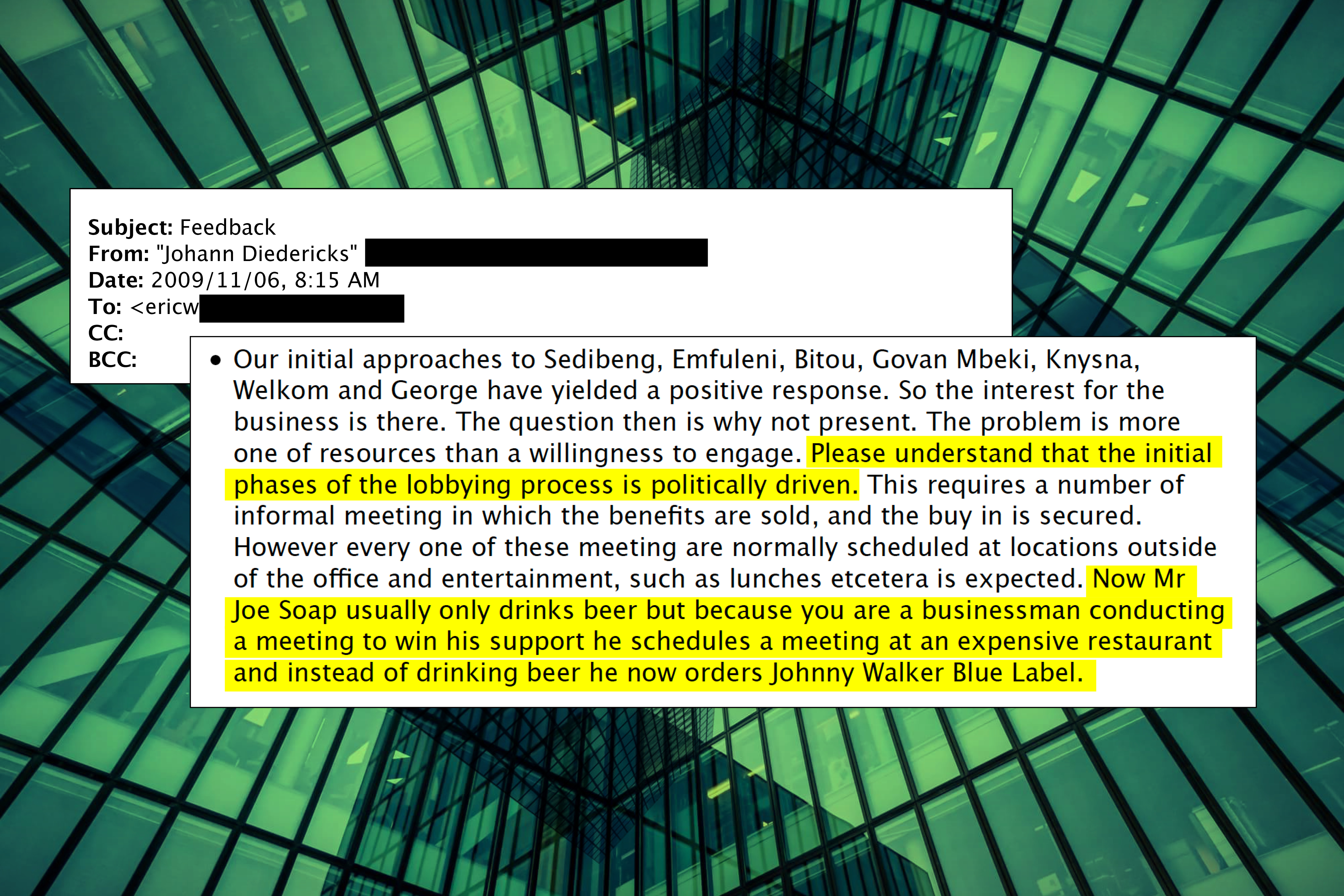
“Now Mr Joe Soap usually only drinks beer but because you are a businessman conducting a meeting to win his support he schedules a meeting at an expensive restaurant and instead of drinking beer he now orders Johnny Walker Blue Label.”
But was expensive whisky all Diedricks was buying? When asked about the “incentives” paid to “subcontracted consultants”, Diedricks demurred, saying he only planned to split the fees with his business partner.
Diedricks had initially asked for R100,000 – 40% upfront – plus an “x%” success fee, later set at 25% of Regiments’ fees, according to a draft joint venture agreement. If he could secure an upfront payment for Regiments from the client, Boussolé wanted 50% of the upfront fee, and if Boussolé was able to negotiate fees over-and-above an agreed upon benchmark, it wanted 60% of the extras fees as well.
Diedrick’s proposal to Regiments represented potentially hundreds of millions of rands in fees to him, extracted from municipalities like Tshwane, Emalahleni and Mbombela and struggling state-owned entities like Eskom – and suggests that the services Boussolé offered went far beyond scheduling appointments.
Whether Regiments baulked at the fees is unclear. Diedricks told us Boussolé and Regiments parted ways without the contract being signed and that he was eventually paid just R30,000 for his services.
But Regiments did not abandon the idea of using politically-connected insiders to open state coffers. In 2012, a golf buddy of Regiments director Niven Pillay introduced him to a 34-year-old hustler called Salim Essa and Regiments’ fate was sealed. Secretive agreements, emails and invoices show that Regiments agreed to pay up to 60% of the fees to Essa for his help in securing contracts.
This time it worked: Over the next five years Regiments would receive contracts from Transnet alone worth R1-billion. (For more read amaBhungane’s Trojan Horse investigation).
As Regiments cashed in, it continued to donate to the ANC. Emails show that in September 2015, the ANC Women’s League asked Regiments to pay a R344,858 invoice for flights; the following month, the directors agreed to pay R1-million for t-shirts for the ANC’s National General Congress; and finally, there was a R700,000 gold package for the ANC’s January 8 gala dinner.
But by 2016 Regiments was in trouble. Wood had left to form Trillian with Essa, taking the company’s rainmaker and apparent access to Transnet contracts with him. In August that year, the ANC lost control of the City of Johannesburg, which had been an important source of Regiments’ revenue. The party was over.
The path well-paved
The Regiments story has been subject to constant revision. First, Regiments portrayed itself as the victim, a shining star in the financial services industry that was snuffed out when its owners refused to sell the company to the Guptas.
Then, when it became apparent that Regiments had been channelling half its income to Essa, the story was rewritten, making Wood – who broke away to form Trillian – the bad guy.
But that version did not survive the disclosure that other directors knew about the constant stream of money flowing to Essa.
Instead what the emails show is that when the Guptas arrived they found the path well-paved by companies like Regiments who had poured money into the political system in the hope of converting proximity to the ANC into government contracts.
The Guptas, it turned out, were just better at it. DM
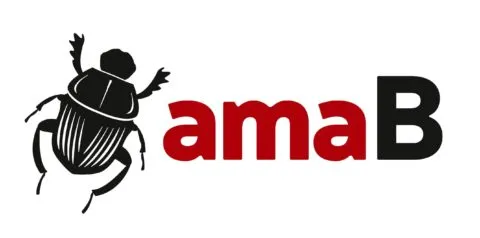
The amaBhungane Centre for Investigative Journalism, an independent non-profit, produced this story. Like it? Be an amaB Supporter to help us do more. Sign up for our newsletter and WhatsApp alerts to get more.
For newsletter signup:
https://amabhungane.org/#signup
For WhatsApp:
https://amabhungane.org/#whatsapp
For Amab support:
https://amabhungane.org/be-an-amab-supporter/

















 Become an Insider
Become an Insider